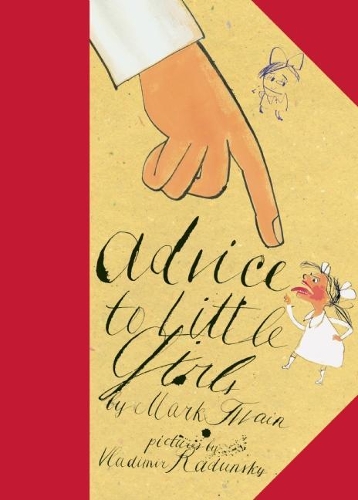
Advice to Little Girls
(Hardback)
Publishing Details
Advice to Little Girls
By (Author) Vladimir Radunsky
By (author) Mark Twain
Enchanted Lion Books
Enchanted Lion Books
4th April 2013
United States
Classifications
General
Non Fiction
FIC
Physical Properties
Hardback
24
Width 177mm, Height 241mm
255g
Description
You should ever bear in mind that it is to your kind parents that you are indebted for your food, and for the privilege of staying home from school when you let on that you are sick. Therefore you ought to respect their little prejudices, and humor their little whims, and put up with their little foibles until they get to crowding you too much.
When Mark Twain wrote the sparky short story "Advice to Little Girls" in 1865, he probably didn't mean for it to be shown to them. Or maybe he did, since we all know Twain was a rascal. Now, author and illustrator Vladimir Radunsky has created a picture book based on Twain's text that adds all the right outlandish touches.
Born on November 30, 1835, in Florida, Missouri, Samuel L. Clemens wrote under the pen name Mark Twain. He wrote two major classics of American literature, The Adventures of Tom Sawyer and Adventures of Huckleberry Finn. He was also a riverboat pilot, journalist, lecturer, entrepreneur, and inventor. Whether or not it was Mark Twain's actual intention for little girls to read this humorous short story, it's clear that he did not talk down to children, but rather expected them to stretch themselves in order to grasp sophisticated, adult meaning.
Vladimir Radunsky has illustrated many books to great acclaim. Recently, Radunsky has been moving farther and farther away from the traditional picture book and into other more innovative forms. The most recent example is a work published by HarperCollins of hip-hop poetry for children, where the graffiti art has migrated from the walls into a printed book. Radunsky has published more than thirty books for children, mostly in the United States. Many of them were translated and published in France, the United Kingdom, Italy, Spain, the Netherlands, Germany, and Japan.
Reviews
Brain Pickings' Top 13 Children's, Illustrated, and Picture Books of 2013 "Crisply satirical and a little subversive, Twain's short, acerbic sendup slyly exhorts little girls to take a calculating approach to manipulating friends, brothers and elders. [...] An elegant curiosity for admirers of Twain, Radunsky or both." -- Kirkus Review "Radunsky's ink flourishes and adorable, lumpy figures steal the stage." -- Publishers Weekly "Twain did not squat down to be heard and understood by children, but asked them to stand on their tiptoes--to absorb the kind of language and humor suitable for adults." -- New York Review of Books "While frolicsome in tone and full of wink, the story -- like the most timeless of children's books -- is colored with subtle hues of grown-up philosophy on the human condition, exploring all the deft ways in which we creatively rationalize our wrongdoing and reconcile the good and evil we each embody." -- Brain Pickings "it is sharp, a pointed set of admonitions urging girls to think for themselves, which is a message as essential today as it was a century-and-a-half ago." -- The Los Angeles Times "a sharp, charming story suitable for smart girls (and grown ups!) everywhere, and Radunsky's illustrations bring it to scribbled, red-cheeked life. It may just be the best picture book we've ever read." -- Flavorwire
Author Bio
Vladimir Radunsky has illustrated many wonderful books, including The Maestro Plays by Bill Martin Jr and Woody Guthrie's Howdi Do. He is also the author-illustrator of 10 (ten), The Mighty Asparagus, and (with Chris Raschka) of Table Manners. Born on November 30, 1835, in Florida, Missouri, Samuel L. Clemens wrote under the pen name Mark Twain and went on to pen several novels, including two major classics of American literature, The Adventures of Tom Sawyer and Adventures of Huckleberry Finn. He was also a riverboat pilot, journalist, lecturer, entrepreneur and inventor. It is unknown whether it was Mark Twain's actual intention for little girls to read this humorous short story published in 1867. What is clear is that he did not talk down to children, but rather expected them to stretch themselves in order to grasp sophisticated and perhaps even adult meanings.
